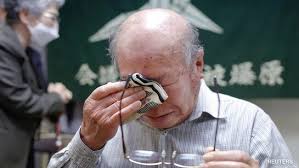OSLO: Japanese organisation Nihon Hidankyo, a grassroots movement of atomic bomb survivors from Hiroshima and Nagasaki, won the Nobel Peace Prize on Friday, in a warning to countries who have nuclear weapons not to use them.
Many survivors of the only two nuclear bombs ever to be used in conflict, who are known in Japanese as “hibakusha”, have dedicated their lives to the struggle for a nuclear-free world. The Norwegian Nobel Committee said the group was receiving the prize for its efforts to achieve a world free of nuclear weapons and for demonstrating through witness testimony that nuclear weapons must never be used again. Hidankyo’s Hiroshima branch chairperson, Tomoyuki Mimaki, who was standing by at the city hall for the announcement, cheered and teared up when he received the news.
“Is it really true? Unbelievable!” Mimaki screamed. The US dropped an atomic bomb on Nagasaki on August 9, 1945, killing 70,000 people, three days after its bombing of Hiroshima killed 140,000. Japan surrendered on August 15, 1945,ending the World War II and its nearly half-century of aggression across Asia.
Nihon Hidankyo was formed in 1956 by survivors of the attacks and victims of nuclear weapons tests in the Pacific amid demands for government support for health problems. Mimaki, a survivor himself, said the award would give a major boost to its efforts to demonstrate that the abolition of nuclear weapons was possible. “(The win) will be a great force to appeal to the world that the abolition of nuclear weapons and everlasting peace can be achieved,” he said, adding, “Nuclear weapons should absolutely be abolished.”
“The atomic bomb survivors from Hiroshima and Nagasaki, also known as the hibakusha, are selfless, soul-bearing witnesses of the horrific human cost of nuclear weapons,” UN Secretary-General Antonio Guterres said in a congratulatory statement.
Without naming specific countries, Joergen Watne Frydnes, chair of the Norwegian Nobel Committee, warned that nuclear nations should not contemplate using atomic weapons. “In a world ridden (with) conflicts, where nuclear weapons are definitely part of it, we wanted to highlight the importance of strengthening the nuclear taboo, the international norm, against the use of nuclear weapons,” Frydnes said.


